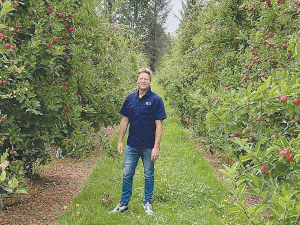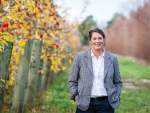Two years ago, Cyclone Gabrielle swept through apple and kiwifruit orchards in Hawke's Bay causing massive damage that has changed the region for ever.
Brydon Nisbet, the president of Hawke's Bay Fruit Growers Federation and a member of Horticulture NZ board, reflects on how the recovery has gone thus far and what the future looks like for apple orchardists like him.
He says if you looked at his orchard now at Puketapu, one of the worst hit areas, you'd hardly know that a cyclone had been through the place leaving massive deposits on silt that have taken months to remove. But Nisbett says the fact that trees are growing and producing a good crop this season is only half the story.
He says trees that appeared to have recovered are still dying at the hands of a water-borne disease called Phytophthora, whose fungi-like organisms lead to root rot disease causing plants to wilt and die.
"I have lost many trrees and so have others. It often takes time for the effects of Phytophthora to kick in and every time you grow a crop of apples, this may stress a tree, and it just dies," he told Rural News.
On top of that there is the financial costs of the cyclone which will leave most of those growers who've decided to remain in business in debt for many years.
Nisbet says the cyclone has forced him to borrow a lot of money and while he's been able to get a loan from his bank it will be some time before he can pay off the debt.
In Hawke’s Bay, many orchardists whose properties were badly damaged have quit the industry and sold their land to other orchardists. Others have turned to growing vegetables on the land as a means of creating cashflow. He says a lot more maize, onions and squash are now being grown.
But others like himself replanted trees last year and will plant more this year.
“But in essence the recovery has gone well. Gabrielle destroyed 610 hectares of apple orchards in the region and right now 459 hectares has been replanted,” he says.



















